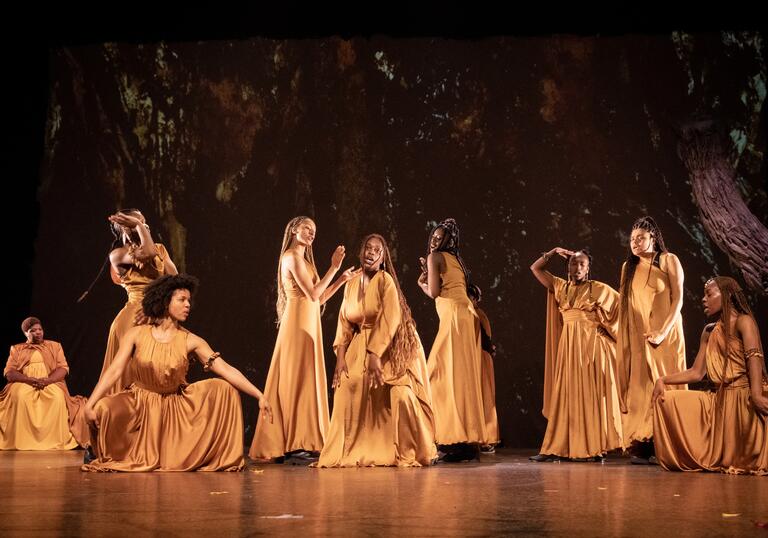At the start of the 20th century, Nana Yaa Asantewaa – queen mother of the Asante people in what is now Ghana – led her people’s war against the British Empire. The colonisers were slaughtering the Asante to gain access to their natural resources, such as timber, gold and cocoa.
However, as the tide of war began to turn, and the Asante were about to lose, the British demanded they hand over the Golden Stool – the symbol of the nation’s power for hundreds of years. But Yaa Asantewaa replaced it with a fake one, so the British could never morally win over the Asante.
This is the starting point for a powerful and innovative work by multidisciplinary artist Gorges Ocloo: The Golden Stool, or the story of Nana Yaa Asantewaa.
‘When I was growing up in Ghana, Nana Yaa Asantewaa was a true goddess,’ he says. ‘She was highly respected for what she had done for the Asante people during the war and was even pictured on their currency.
‘When I went back in 2022 to do my research for The Golden Stool or the story of Nana Yaa, I was very disappointed to see there was no respect left for her legacy. I envisioned doing a piece about her life, spanning from her birth to her death, but noticing how forgotten she was, I re-shaped the idea. It became a work about brave women throughout history, women speaking their minds and standing up for themselves. As it says in the piece, “Brave women are always forgotten. Murderous men are remembered.” My work always carries a strong, often political message - a reason to bring something to the stage, a story that needs to be told.’
Known for his multidisciplinary approach, Ocloo uses music, contemporary dance, performance art, visual arts and scenography in his theatre and dance productions. For The Golden Stool, the staging is minimal, set in the Sahara, with the floor used as a huge percussive element - triggered by the dancing, stomping and movements of the ten women on stage.
‘The energy flows non-stop throughout the piece, from beginning to end,’ says Ocloo, who is artist in residence at the renowned LOD Musiktheater in Belgium.
He describes the production as ’a musical confrontation between Europe and Africa, injecting twelve classical Western opera songs with highly rhythmic percussion. It’s what I call “AfrOpera”. I play a game with the appropriation of cultural symbols, like the English did with the Golden Stool. I don’t steal the music; I just borrow it for a while.’
Soprano Nobulumko Mngxekeza-Nziramasanga and mezzo-soprano Nonkululeko Nkwinti are joined by eight other women on stage for this mesmerising work.
‘Eight out of the ten singers on stage didn’t have anything to do with classical music, but they started singing this medley of different feminist songs during lunch break – strong women from their own time – so I decided to bring that into the piece,’ says Ocloo. ‘It becomes a blend of strong female voices from all ages. In this scene, it’s about the women on stage, about who they are, and not their characters. It’s them saying: “This is enough”.’
The result is a powerful energy that thunders from the stage. ‘What [the performers] are doing for almost two hours – singing, dancing, acting – amazes me. None of these women knew each other before, but within days, they connected with each other to become this unified group and started feeling what I wanted to tell on stage.
‘The piece is not mine any more; it’s theirs now.’
The Golden Stool, or the story of Nana Yaa Asantewaa, 14 Oct, 7.30pm, Hall

